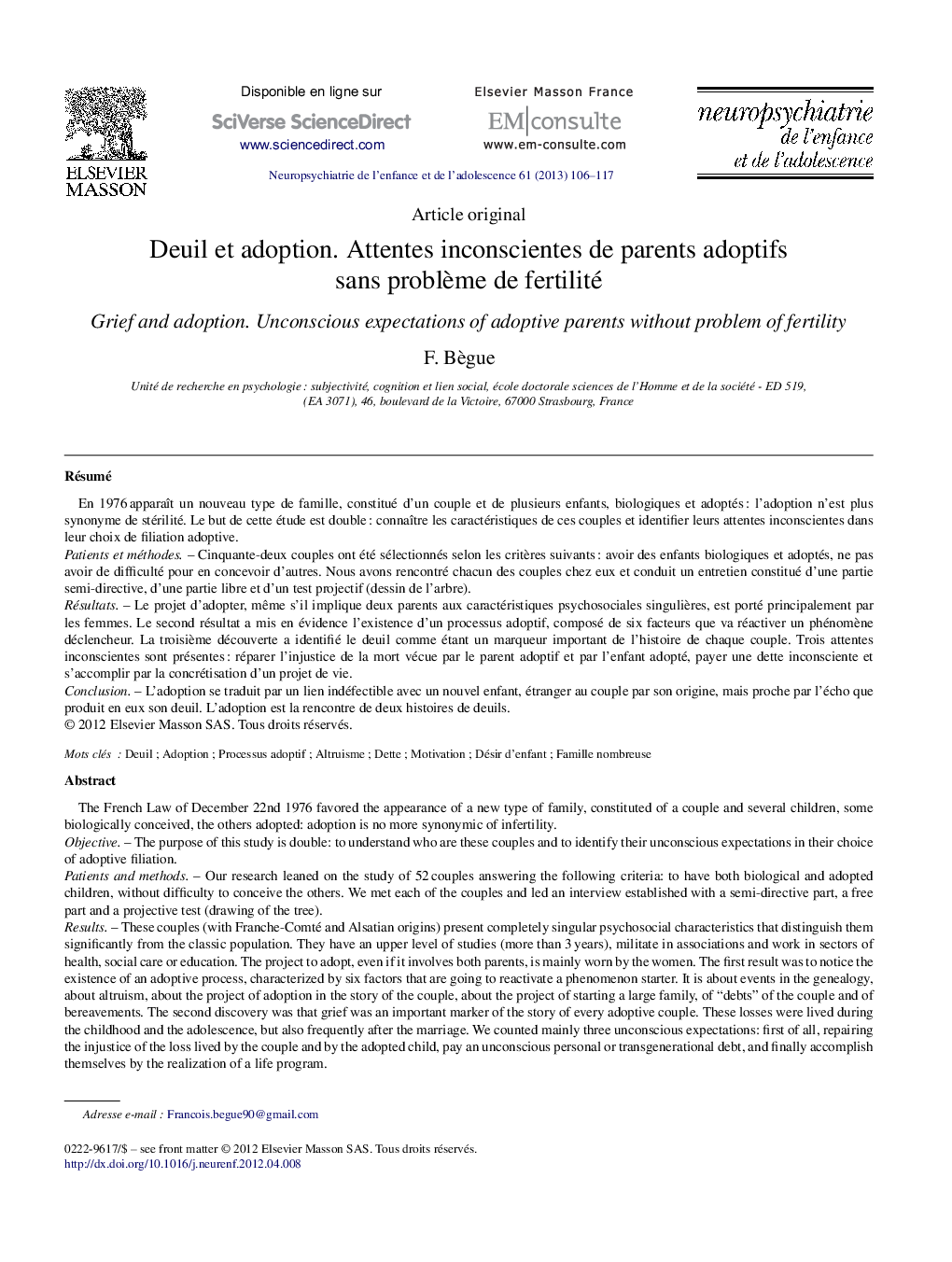| کد مقاله | کد نشریه | سال انتشار | مقاله انگلیسی | نسخه تمام متن |
|---|---|---|---|---|
| 943902 | 925570 | 2013 | 12 صفحه PDF | دانلود رایگان |

RésuméEn 1976 apparaît un nouveau type de famille, constitué d’un couple et de plusieurs enfants, biologiques et adoptés : l’adoption n’est plus synonyme de stérilité. Le but de cette étude est double : connaître les caractéristiques de ces couples et identifier leurs attentes inconscientes dans leur choix de filiation adoptive.Patients et méthodesCinquante-deux couples ont été sélectionnés selon les critères suivants : avoir des enfants biologiques et adoptés, ne pas avoir de difficulté pour en concevoir d’autres. Nous avons rencontré chacun des couples chez eux et conduit un entretien constitué d’une partie semi-directive, d’une partie libre et d’un test projectif (dessin de l’arbre).RésultatsLe projet d’adopter, même s’il implique deux parents aux caractéristiques psychosociales singulières, est porté principalement par les femmes. Le second résultat a mis en évidence l’existence d’un processus adoptif, composé de six facteurs que va réactiver un phénomène déclencheur. La troisième découverte a identifié le deuil comme étant un marqueur important de l’histoire de chaque couple. Trois attentes inconscientes sont présentes : réparer l’injustice de la mort vécue par le parent adoptif et par l’enfant adopté, payer une dette inconsciente et s’accomplir par la concrétisation d’un projet de vie.ConclusionL’adoption se traduit par un lien indéfectible avec un nouvel enfant, étranger au couple par son origine, mais proche par l’écho que produit en eux son deuil. L’adoption est la rencontre de deux histoires de deuils.
The French Law of December 22nd 1976 favored the appearance of a new type of family, constituted of a couple and several children, some biologically conceived, the others adopted: adoption is no more synonymic of infertility.ObjectiveThe purpose of this study is double: to understand who are these couples and to identify their unconscious expectations in their choice of adoptive filiation.Patients and methodsOur research leaned on the study of 52 couples answering the following criteria: to have both biological and adopted children, without difficulty to conceive the others. We met each of the couples and led an interview established with a semi-directive part, a free part and a projective test (drawing of the tree).ResultsThese couples (with Franche-Comté and Alsatian origins) present completely singular psychosocial characteristics that distinguish them significantly from the classic population. They have an upper level of studies (more than 3 years), militate in associations and work in sectors of health, social care or education. The project to adopt, even if it involves both parents, is mainly worn by the women. The first result was to notice the existence of an adoptive process, characterized by six factors that are going to reactivate a phenomenon starter. It is about events in the genealogy, about altruism, about the project of adoption in the story of the couple, about the project of starting a large family, of “debts” of the couple and of bereavements. The second discovery was that grief was an important marker of the story of every adoptive couple. These losses were lived during the childhood and the adolescence, but also frequently after the marriage. We counted mainly three unconscious expectations: first of all, repairing the injustice of the loss lived by the couple and by the adopted child, pay an unconscious personal or transgenerational debt, and finally accomplish themselves by the realization of a life program.ConclusionThe adoption is built on an indestructible link with a new child, foreign to the couple due to his origin, but close to them by the echo produced in their experience of grief. The adoption is the meeting of two losses and bereavement stories.
Journal: Neuropsychiatrie de l'Enfance et de l'Adolescence - Volume 61, Issue 2, March 2013, Pages 106–117